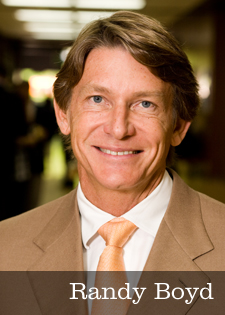Randy Boyd helps clear educational roadblocks for future generations
 The College of Education, Health, and Human Sciences and Knox County Schools will partner to improve the lives—and education—of children at one local school, thanks to a three-year pilot project funded by UT alumnus and Doyle High School (now South–Doyle) graduate Randy Boyd.
The College of Education, Health, and Human Sciences and Knox County Schools will partner to improve the lives—and education—of children at one local school, thanks to a three-year pilot project funded by UT alumnus and Doyle High School (now South–Doyle) graduate Randy Boyd.
Boyd, founder, president, and CEO of Radio Systems of Knoxville, has given $323,850 to UT Knoxville’s College of Education, Health, and Human Sciences to further Professor Bob Kronick’s work through the Full-Service Community School Collaborative Project.
“An overriding theme of the project is that students who are hungry and are lacking in other basic needs are at a disadvantage in their learning process,” Kronick says. “By meeting the extracurricular needs of children and families, the full-service school ensures that learning will happen for all students.”
Pond Gap Elementary School will be the focus of this project for the coming academic year, according to Knox County Schools. Pond Gap’s mission will be broadened to provide health, mental-health, and other services for students and families. The immediate goal is to supply some basic care—offering meals, doing laundry—that families are unable to provide for themselves. Longer-term goals are to prevent crime, mental illness, and poverty.
Says Jim McIntyre, superintendent of the Knox County Schools, “We are very thankful for Mr. Boyd’s investment in this initiative and believe it has enormous potential to enable increased student academic achievement in our high-needs schools.”
Boyd’s gift is the first significant dedicated funding the full-service schools effort has received. Some of the gift will be used to hire an after-school coordinator to be located in the school. UT student volunteers and UT undergraduates enrolled in Kronick’s course “Service Learning and the University Student” will play key roles.
“The best teacher in the world can’t reach these children without help,” Kronick says. “So school clinics are established and staffed by pre-med students. UT graduate students in school and mental-health counseling also work in the school, referring clients to outside agencies when necessary.
Boyd says his work with other education programs has convinced him that many student-success efforts come too late.
“We realized we needed to reach our youth as early as possible to really make a difference,” Boyd says. “Dr. Kronick shared his vision for a full-service school, and I thought it was a very compelling, smart solution. It leverages the physical infrastructure already in place in the school buildings. It leverages the talents of hundreds of students from UT, and it leverages many other community organizations.
“If it works as we hope it will, I believe it is very scalable and sustainable. The leadership provided by UT is the catalyst for this program; the passion of its students will make it successful. We can really transform not just the lives of the students, but whole communities through this initiative.”
Bob Rider, dean of the College of Education, Health, and Human Sciences, says the project is a forward-thinking initiative.
“Full-service school projects attempt to improve a child’s academic performance by attacking many of the outside forces that threaten to hinder it,” he says. “This is not an educational fad; it is a realistic tactical approach to improving education in the twenty-first century.”
